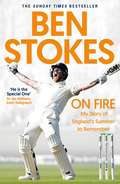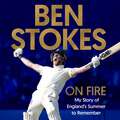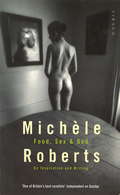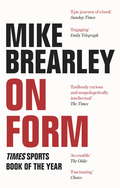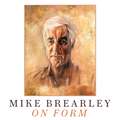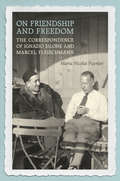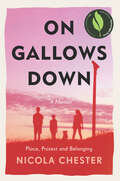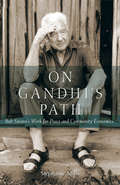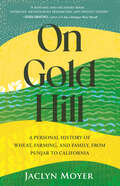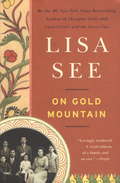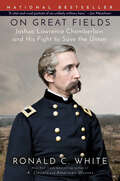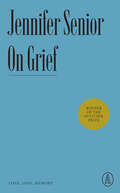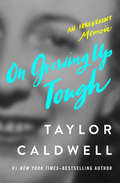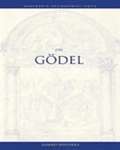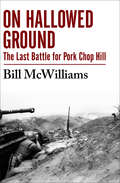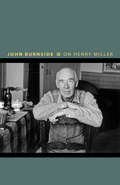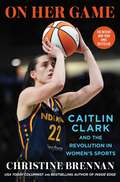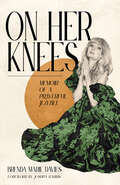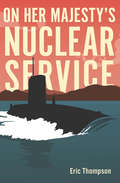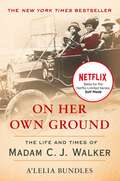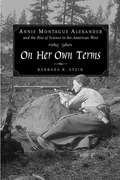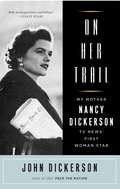- Table View
- List View
On Fire: My Story of England's Summer to Remember
by Ben StokesTHE SUNDAY TIMES BESTSELLERSHORTLISTED FOR SPORTS AUTOBIOGRAPHY OF THE YEAR AT THE 2020 TELEGRAPH SPORTS BOOK AWARDS.BEN STOKES: WINNER OF THE 2019 BBC SPORTS PERSONALITY OF THE YEAR AWARD'He is the Special One, and I intend to call him that for the rest of his career' Sir Ian Botham, Daily Telegraph'There are not enough superlatives to describe Ben Stokes' Nasser Hussain, Daily Mail'The undisputed hero of English cricket' The TimesEarly evening on Sunday 14th July 2019. Lord's Cricket Ground in London. Something unprecedented had just happened: England had won the Cricket World Cup for the very first time since the tournament's inception in 1975. At the epicentre of England's historic triumph was Ben Stokes, the talismanic all-rounder with an insatiable appetite for The Big Occasion. He contributed a critical 84 runs off 98 balls when England batted, a seemingly nerveless innings of discipline and maturity. Thrillingly, it was enough to tie the scores at 241 runs each, so the match reverted to a Super Over - just six balls for each side to bat in the ultimate in sporting sudden-death. Stokes and Jos Buttler saw England to 15 runs off their over. When it was finally confirmed that Martin Guptill had been run out off the very last ball of New Zealand's Super Over with the scores level once again, England had astonishingly won on the boundary count-back, and the nation could finally breathe again.Early evening on Sunday 25th August 2019. A sun-drenched Headingley in Leeds. Having been bowled out for just 67 earlier in the Third Test, England were facing the prospect of failing to regain the Ashes. In their second innings England were still 73 runs short of victory with a solitary wicket remaining. Australia were near certainties to retain the Ashes there and then. Cue one of the most amazing innings ever witnessed as Ben Stokes thrashed the Australian bowlers to all corners of the ground, in the process scoring 135 not out, driving England to a barely-believable one-wicket victory, and keeping the series very much alive. The nation took another breath.On Fire is Ben Stokes' brand new book, and in it he tells the story of England's electrifying first ever Cricket World Cup triumph, as well as this summer's momentous Ashes Test series. It is the ultimate insider's account of the most nerve-shredding but riveting three-and-a-half months in English cricket history.
On Fire: My Story of England's Summer to Remember
by Ben StokesTHE SUNDAY TIMES BESTSELLERSHORTLISTED FOR SPORTS AUTOBIOGRAPHY OF THE YEAR AT THE 2020 TELEGRAPH SPORTS BOOK AWARDS.BEN STOKES: WINNER OF THE 2019 BBC SPORTS PERSONALITY OF THE YEAR AWARDEarly evening on Sunday 14th July 2019. Lord's Cricket Ground in London. Something had just happened in the sport of cricket that had never happened before: England had won the Cricket World Cup for the very first time since the tournament's inception in 1975. At the epicentre of England's historic triumph was Ben Stokes, the talismanic all-rounder with an insatiable appetite for The Big Occasion. He contributed an absolutely critical 84 runs off 98 balls when England batted, a seemingly nerveless innings of discipline and maturity. Thrillingly, it was enough to tie the scores at 241 runs each, so the match reverted to a Super Over - just six balls for each side to bat in the ultimate in sporting sudden-death. Stokes and his batting partner Jos Buttler saw England to 15 runs off their over. When it was finally confirmed that Martin Guptill had been run out off the very last ball of New Zealand's Super Over with the scores once again level, England had astonishingly won on the boundary count-back, and the nation could finally breathe again.Early evening on Sunday 25th August 2019. A sun-drenched Headingley in Leeds. Having been bowled out for just 67 earlier in the Third Test, England were facing the prospect of failing to regain the Ashes. In their second innings England were still 73 runs short of victory with a solitary wicket remaining. Australia were near certainties to retain the Ashes there and then. Cue one of the most amazing innings ever witnessed as Ben Stokes thrashed the Australian bowlers to all corners of the ground, in the process scoring 135 not out, driving England to a barely-believable one-wicket victory, and keeping the series very much alive. The nation took another breath.In his brand new book, Ben Stokes tells the story of England's electrifying first ever Cricket World Cup triumph, as well as this summer's momentous Ashes Test series. It is the ultimate insider's account of the most nerve-shredding but riveting three-and-a-half months in English cricket history.(P) 2019 Headline Publishing Group
On Food, Sex And God: On Inspiration and Writing
by Michele RobertsFood, sex and God' is what Michèle Roberts answers when strangers ask what she writes about, and indeed, she has made these subjects her own in her fiction and her poetry. Now we see that extended to non-fiction in this collection of essays, reviews and articles. Ranging over people and places, writing and imagination, books, spirituality, art and food, Roberts shows herself to be a perceptive and provocative commentator on contemporary life. From a funny monologue on would-be writers who prefer last year's creative writing teacher (male); to musings on a writer's life and work; to reviews of Marina Warner and Jeanette Winterson; to a magnificent piece on autobiographical writing and the imagination, this collection adds to our understanding of her as writer. Her keen sense of the outrageous, her striving for intellectual honesty and her ability to find the sensual in the everyday, leave one in no doubt about a talent that is as original and generous in non-fiction as in her celebrated novels.
On Food, Sex And God: On Inspiration and Writing
by Michele RobertsFood, sex and God' is what Michèle Roberts answers when strangers ask what she writes about, and indeed, she has made these subjects her own in her fiction and her poetry. Now we see that extended to non-fiction in this collection of essays, reviews and articles. Ranging over people and places, writing and imagination, books, spirituality, art and food, Roberts shows herself to be a perceptive and provocative commentator on contemporary life. From a funny monologue on would-be writers who prefer last year's creative writing teacher (male); to musings on a writer's life and work; to reviews of Marina Warner and Jeanette Winterson; to a magnificent piece on autobiographical writing and the imagination, this collection adds to our understanding of her as writer. Her keen sense of the outrageous, her striving for intellectual honesty and her ability to find the sensual in the everyday, leave one in no doubt about a talent that is as original and generous in non-fiction as in her celebrated novels.
On Form: The Times Book of the Year
by Mike BrearleyTHE TIMES BOOK OF THE YEARDAILY TELEGRAPH SPORTS BOOKS OF THE YEARLONGLISTED FOR THE WILLIAM HILL SPORTS BOOK OF THE YEAR 2017What is being on form? How does it relate to feeling 'in the zone'? Are these states in the lap of the gods, a matter of which side of the bed we got out of that morning? Or is there anything we can do to make their arrival more likely?In this fascinating book, former England cricket captain and psychoanalyst Mike Brearley draws on his own experiences, both on and off the field, and examines many of the elements of being in and out of form across a number of different disciplines - not only in cricket and psychoanalysis but also in finance, music, philosophy, medicine, teaching, tree surgery and drama.Perceptive and engaging, On Form is an exploration of the benefits and risks of being on form and can help us all reflect on the range of conditions that block or liberate us.
On Form: The Times Book of the Year
by Mike BrearleyTHE TIMES BOOK OF THE YEARLONGLISTED FOR THE WILLIAM HILL SPORTS BOOK OF THE YEARWhat is being on form? How does it relate to feeling 'in the zone'?Are these states in the lap of the gods, a matter of which side of the bed we got out of that morning? Or is there anything we can do to make their arrival more likely?In this fascinating book, former England cricket captain and psychoanalyst Mike Brearley examines many of the elements of being in and out of form across a number of different disciplines - not only in cricket and psychoanalysis but also in finance, music, philosophy, medicine, teaching, tree surgery and drama. Drawing on his own experiences, both on and off the field, Brearley describes various states of mind, from the conscious determination involved in training and practice through to that almost spiritual state of being 'inspired'. To achieve any level of form requires us to be able to hold different tensions in mind, and to tolerate both ambivalence and ambiguity. Neither form nor creativity can be guaranteed - Brearley illustrates in depth the frequent ways we lose form - though understanding, in a full sense, enables us to make drastic loss of form less likely.Perceptive and engaging, On Form is an exploration of the benefits and risks of being on form and can help us all reflect on the range of conditions that block or liberate us.PRAISE FOR THE ART OF CAPTAINCY:'A work of real substance, valued for its practicality and its precision as well as its balanced humanity and insight' Hilary Mantel'The best book on captaincy, written by an expert' Mike Atherton'A subtle, wise book' Ed Smith'The man-management skills demonstrated by Brearley's handling of Ian Botham remain an inspiration' Nasser Hussain'The Art of Captaincy was, and is, an outstanding book. I would add only three words which I always bear in mind. Keep it simple' Richie Benaud
On Friendship and Freedom: The Ignazio- Marcel Fleischmann Correspondence
by Maria Nicolai PaynterIgnazio Silone, the anti-fascist, Italian author and political activist, continues to intrigue readers and stimulate their minds nearly four decades after his death. On Friendship and Freedom contains the first published collection of correspondence between Silone and his longtime friend the philanthropist and art collector Marcel Fleischmann. Maria Nicolai Paynter, a recognized authority on Silone and his work, deftly guides the reader through the years dominated by Fascism and Nazism as well as the decades leading up to Silone's death in 1978. Of particular interest for its human value, the correspondence gathered in this volume is most inspiring in that it reveals how two men of different cultural and religious backgrounds join together and share true friendship against all odds.
On Gallows Down: Place, Protest and Belonging
by Nicola ChesterPart nature writing, part memoir, On Gallows Down is an essential, unforgettable read for fans of Helen Macdonald, Terry Tempest Williams, and Robin Wall Kimmerer. Nicola Chester won the BBC Wildlife Magazine’s Nature Writer of the Year Award – this is her first book. On Gallows Down is a powerful, personal story shaped by a landscape; one that ripples and undulates with protest, change, hope – and the search for home. From the girl catching the eye of the “peace women” of Greenham Common to the young woman protesting the loss of ancient and beloved trees, and as a mother raising a family in a farm cottage in the shadow of grand, country estates, this is the story of how Nicola Chester came to write – as a means of protest. The story of how she discovered the rich seam of resistance that runs through her village of Newbury and its people – from the English Civil War to the Swing Riots and the battle against the Newbury Bypass. And the story of the hope she finds in the rewilding of Greenham Common after the military left, the stories told by the landscapes of Watership Down, the gallows perched high on Inkpen Beacon and Highclere Castle (the setting of Downtown Abbey). Nature is indelibly linked to belonging for Nicola. She charts her story through the walks she takes with her children across the chalk hills of the North Wessex Downs, though the song of the nightingale and the red kites, fieldfares, skylarks and lapwings that accompany her; the badger cubs she watches at night; the velvety mole she discovers in her garden and the cuckoo, whose return she awaits. On Gallows Down tells of how Nicola came to realize that it is she who can decide where she belongs, for home is a place in nature and imagination, which must be protected through words and actions. "We are writing for our very lives and for those wild lives we share this one, lonely planet with."—Nicola Chester
On Gandhi's Path: Bob Swann's Work for Peace and Community Economics
by Stephanie MillsThis inspiring biography explores the life and work of the land trust pioneer, peace activist, and father of the relocalization movement.Robert Swann was a self-taught economist and a tireless champion of decentralism, promoting community resilience and food independence. A conscientious war resistor imprisoned for his beliefs, Bob Swann engaged in lifelong nonviolent direct action against war, racism, and economic inequity. His legacy is a vision of a life-affirming, alternative economy based on land and monetary reform.Swann’s story is also the untold history of decentralism in the United States. He forged tools to build productive, resilient local and regional economies. He associated with a constellation of vital, intelligent, independent authors and activists, and ultimately co-founded the Schumacher Society based on the philosophies of Small Is Beautiful author E. F. Schumacher.Now as global industrial civilization flails in the throes of ecological and economic crisis, Swann’s innovations are at the ready to help neighborhoods, local entrepreneurs, and willing communities rebuild at appropriate scales.
On Gold Hill: A Personal History of Wheat, Farming, and Family, from Punjab to California
by Jaclyn MoyerA young South Asian American woman's story of reconnecting with her identity, family, and heritage through sustainable farmingIn 2012, 25-year-old Jackie Moyer—the daughter of a forbidden marriage between a white American father and a Punjabi American mother—leased 10 acres of land in Gold Hill, California, and embarked on a career in organic farming. With a fractured relationship to her heritage, Moyer saw an opportunity for repair when she learned of a nearly lost heirloom wheat variety called Sonora.Sonora wasn&’t just an heirloom wheat strain; it was her own cultural heirloom. Its history can be traced back to Punjab, the Indian state where Moyer&’s own roots are planted. In growing the grain on her farm, she began to uncover the multigenerational story of her family&’s resilience.From California to Punjab, the past to the present, Jackie maps her personal story atop the entangled histories of wheat cultivation and the rise of the organic farming movement. With a passion for dismantling the exploitative big-agriculture industry, she examines how the development of high-yielding varieties and chemical fertilizers has harmed our relationship with food, the planet, and each other.Braiding memoir with historical inquiry, On Gold Hill explores the complexities of the immigrant experience, illuminates the ways colonialism and capitalism constrain our food system, and investigates what it means to lose—and to reclaim—one&’s heritage.
On Gold Mountain
by Lisa SeeSee has constructed this sweeping chronicle of her Chinese-American family, a work that takes in stories of racism and romance, entrepreneurial genius and domestic heartache, secret marriages and sibling rivalries, in a powerful history of two cultures meeting in a new world.
On Gold Mountain
by Lisa SeeOut of the stories heard in her childhood in Los Angeles's Chinatown and years of research, See has constructed this sweeping chronicle of her Chinese-American family, a work that takes in stories of racism and romance, entrepreneurial genius and domestic heartache, secret marriages and sibling rivalries, in a powerful history of two cultures meeting in a new world. 82 photos.
On Gold Mountain
by Lisa SeeOut of the stories heard in her childhood in Los Angeles's Chinatown and years of research, See has constructed this sweeping chronicle of her Chinese-American family, a work that takes in stories of racism and romance, entrepreneurial genius and domestic heartache, secret marriages and sibling rivalries, in a powerful history of two cultures meeting in a new world. 82 photos.
On Great Fields: The Life and Unlikely Heroism of Joshua Lawrence Chamberlain
by Ronald C. WhiteNATIONAL BESTSELLER • From the author of A. Lincoln and American Ulysses comes the dramatic and definitive biography of Joshua Lawrence Chamberlain, the history-altering professor turned Civil War hero.&“A vital and vivid portrait of an unlikely military hero who played a key role in the preservation of the Union and therefore in the making of modern America.&”—Jon Meacham, Pulitzer Prize–winning author of And There Was LightFINALIST FOR THE GILDER LEHRMAN LINCOLN PRIZE AND THE AMERICAN BATTLEFIELD TRUST BOOK PRIZE FOR HISTORYBefore 1862, Joshua Lawrence Chamberlain had rarely left his home state of Maine, where he was a trained minister and mild-mannered professor at Bowdoin College. His colleagues were shocked when he volunteered for the Union army, but he was undeterred and later became known as one of the North&’s greatest heroes: On the second day at Gettysburg, after running out of ammunition at Little Round Top, he ordered his men to wield their bayonets in a desperate charge down a rocky slope that routed the Confederate attackers. Despite being wounded at Petersburg—and told by two surgeons he would die—Chamberlain survived the war, going on to be elected governor of Maine four times and serve as president of Bowdoin College.How did a stuttering young boy come to be fluent in nine languages and even teach speech and rhetoric? How did a trained minister find his way to the battlefield? Award-winning historian Ronald C. White delves into these contradictions in this cradle-to-grave biography of General Joshua Lawrence Chamberlain, from his upbringing in rural Maine to his tenacious, empathetic military leadership and his influential postwar public service, exploring a question that still plagues so many veterans: How do you make a civilian life of meaning after having experienced the extreme highs and lows of war?Chamberlain is familiar to millions from Michael Shaara&’s now-classic novel of the Civil War, The Killer Angels, and Ken Burns&’s timeless miniseries The Civil War, but in this book, White captures the complex and inspiring man behind the hero. Heavily illustrated and featuring nine detailed maps, this gripping, impeccably researched portrait illuminates one of the most admired but least known figures in our nation&’s bloodiest conflict.
On Grief: Love, Loss, Memory (Atlantic Editions)
by Jennifer SeniorA Pulitzer Prize–winning portrait of one family&’s search for meaning in the face of unspeakable loss. An Atlantic Edition, featuring long-form journalism by Atlantic writers, drawn from contemporary articles or classic storytelling from the magazine&’s 165-year archive.In this Pulitzer Prize–winning work, Jennifer Senior explores the contours of grief through one family&’s twenty-year reckoning with the loss of their son, Bobby McIlvaine Jr., on September 11, 2001. Devastating and expansive, Senior&’s portrait examines her own relationship with the McIlvaine family alongside intimate scenes of both mourning and recovery experienced by Bobby&’s mother, father, younger brother, and soon-to-be fiancée. On Grief generously asks us what it means to consider grief, both personal and national, as an ongoing project.
On Growing Up Tough: An Irreverent Memoir
by Taylor CaldwellThe #1 New York Times–bestselling author shares her rough journey to adulthood in a book that &“should be read by every American&” (Fort Wayne Journal-Gazette). Born in Manchester, England, in 1900, growing up wasn&’t easy for Janet Taylor Caldwell. Her Scottish parents warned her that if she ever misbehaved at school, she&’d be &“thoroughly thrashed.&” Weekends at home were filled with church and chores. When her family immigrated to America in 1907, life only got tougher. Her father died soon after their arrival in upstate New York, and the family struggled financially. But her mother, Anna, was a firm believer in Women&’s Liberation and insisted that Janet could do a man&’s job. With a first-class education, fierce self-reliance, and strong work ethic, Janet embarked on her writing career at the age of eight. Eventually, she was discovered by legendary editor Maxwell Perkins and began publishing under the name Taylor Caldwell. Her books sold millions of copies around the world and touched the lives of countless readers. Here is a witty and sharply observed account of the early struggles that gave Taylor Caldwell her strong convictions and made her one of the most distinctive voices in American literature. &“You&’re not likely to put this one down until the last line is devoured and digested&” (Charleston Sunday News & Courier).
On Gödel
by Jaakko HintikkaThis brief text assists students in understanding Godel's philosophy and thinking so that they can more fully engage in useful, intelligent class dialogue and improve their understanding of course content. Part of the "Wadsworth Philosophers Series," (which will eventually consist of approximately 100 titles, each focusing on a single "thinker" from ancient times to the present), ON G#65533;DEL is written by a philosopher deeply versed in the philosophy of this key thinker. Like other books in the series, this concise book offers sufficient insight into the thinking of a notable philosopher better enabling students to engage in the reading and to discuss the material in class and on paper.
On Hallowed Ground: The Last Battle for Pork Chop Hill
by Bill Mcwilliams Robert W. SennewaldThe definitive account of the final and bloodiest battle for Pork Chop Hill By the summer of 1953, the Korean War had long since reached a stalemate. As peace negotiations dragged on, units of the US 7th Infantry Division rebuilt the defenses of Hill 255, one of numerous outposts in front of the Main Line of Resistance extending across the peninsula. Better known by its nickname, Pork Chop Hill, the outpost had twice been the scene of some of the fiercest fighting of the spring. Now, the soldiers tasked with its rebuilding and defense hoped they would not be the last men to die in what had already become known as "the Forgotten War." On the night of July 6th, under the cover of a heavy monsoon rainstorm, forces of the Chinese 23rd Army attacked. For five hellish days, the opposing forces engaged in devastating artillery assaults, brutal hand-to-hand fighting, and round-the-clock attacks and counterattacks. Less than three weeks after the smoke on Pork Chop Hill cleared, the Korean Armistice Agreement was signed. On Hallowed Ground is the riveting story of this epic battle. Drawing on previously classified documents, interviews, and letters from survivors, author Bill McWilliams details the strategy and tactics behind the conflict and pays stirring tribute to the heroic soldiers and medics who were willing to make the ultimate sacrifice to hold "the Chop."
On Henry Miller: Or, How to Be an Anarchist (Writers on Writers)
by John BurnsideAn engaging invitation to rediscover Henry Miller—and to learn how his anarchist sensibility can help us escape “the air-conditioned nightmare” of the modern worldThe American writer Henry Miller's critical reputation--if not his popular readership—has been in eclipse at least since Kate Millett's blistering critique in Sexual Politics, her landmark 1970 study of misogyny in literature and art. Even a Miller fan like the acclaimed Scottish writer John Burnside finds Miller's "sex books"—including The Rosy Crucifixion, Tropic of Cancer, and Tropic of Capricorn—"boring and embarrassing." But Burnside says that Miller's notorious image as a "pornographer and woman hater" has hidden his vital, true importance—his anarchist sensibility and the way it shows us how, by fleeing from conformity of all kinds, we may be able to save ourselves from the "air-conditioned nightmare" of the modern world.Miller wrote that "there is no salvation in becoming adapted to a world which is crazy," and in this short, engaging, and personal book, Burnside shows how Miller teaches us to become less adapted to the world, to resist a life sentence to the prison of social, intellectual, emotional, and material conditioning. Exploring the full range of Miller's work, and giving special attention to The Air-Conditioned Nightmare and The Colossus of Maroussi, Burnside shows how, with humor and wisdom, Miller illuminates the misunderstood tradition of anarchist thought. Along the way, Burnside reflects on Rimbaud's enormous influence on Miller, as well as on how Rimbaud and Miller have influenced his own writing.An unconventional and appealing account of an unjustly neglected writer, On Henry Miller restores to us a figure whose searing criticism of the modern world has never been more relevant.
On Her Game: Caitlin Clark and the Revolution in Women's Sports
by Christine BrennanA news-making and electrifying portrait of sports phenomenon Caitlin Clark, whose dramatic ascendance in college basketball and now in the WNBA has captured the attention of media and fans unlike any other female team-sport athlete in history—by award-winning USA TODAY columnist and television commentator Christine Brennan.America has never seen an athlete quite like Caitlin Clark. Attracting record-shattering attendance and TV ratings, she has riveted the nation with her famous logo threes and thrilling passes and changed how fans across the country view women&’s sports. Drawing on dozens of extensive interviews and exclusive, behind-the-scenes reporting, veteran journalist Christine Brennan narrates Clark&’s rise—including the formative experiences that led to her scoring more points than any woman or man in major college basketball history—and delivers fascinating new details about Clark&’s Olympic snub by USA Basketball, the safety concerns around her that led to charter flights for all players, the WNBA&’s lack of preparation for heightened national scrutiny, and troubling outbreaks of jealousy and resentment as a white player became the top story in a predominantly Black league. The 2024 season was a watershed. Always taking the high road in the face of criticism, Clark proceeded to write herself into WNBA record books as one of the league&’s most talented rookies ever. And her winning persona—on full display whether surrounded by children begging for autographs or reporters hanging on her every word—made Clark such a fan favorite that increasingly larger arenas needed to be found to accommodate the hordes who traveled hundreds, and sometimes thousands, of miles to watch her play. Clark arrived as a sports and cultural icon a little more than fifty years after the passage of Title IX, the 1972 law that opened the floodgates for girls and women to play sports in America. On Her Game is a sports story, certainly, but it&’s also the story of a nation falling in love with what it has created because of that law—millions of new athletes, led by the magical Caitlin Clark.
On Her Knees: Memoir of a Prayerful Jezebel
by Brenda Marie Davies&“The problem was, because Purity is an idol (a validated and worshiped idol), I didn&’t know who or what I&’d be without my totem. My Christianity depended on Purity.&” Going to a conservative Christian church when she was young, Brenda Marie Davies heard a consistent message—save yourself for marriage—that instilled in her fear and shame about sex. But after moving to Los Angeles at nineteen and finding herself suddenly exposed to a world far outside her comfort zone, she was forced to wrestle with the power and perversity of Christian purity culture. On Her Knees chronicles Brenda&’s spiritual journey over the course of a decade in LA, through marriage, divorce, unlikely friendship, and sexual exploration. Through it all, she began tearing down the false idol of purity while refusing to abandon her faith. Told with raw honesty, sans obligatory shame, this is a story for anyone who wonders if it&’s possible to love God without fearing sex, in all its shades of grey.
On Her Majesty's Nuclear Service
by Eric ThompsonA journey inside the submarines that patrolled beneath the surface to keep the peace during the Cold War, from a Royal Navy officer and engineer. During the Cold War, nuclear submarines quietly helped prevent a third world war, keeping watch and maintaining the deterrent effect of mutually assured destruction. For security reasons, very few knew the inside stories—until now. Eric Thompson is a career nuclear submarine officer who served from the first days of the Polaris missile boats until after the Cold War, ending up as the top engineer in charge of the Navy&’s nuclear power plants. Along the way, he helped develop all manner of kit, from guided torpedoes to the Trident ballistic missile system. In this vivid personal account of his submarine operations, he reveals what it was like to literally have your finger on the nuclear button. He leads the reader through top-secret submarine patrols, hush-hush scientific trials, underwater weapon developments, public relations battles with nuclear protesters, arm wrestling with politicians, and the changes surrounding gender and sexual preference in the Navy. It is essentially a human story, rich in both drama and comedy, like the Russian spy trawler that played dance music at passing submarines. There was never a dull moment—but it was always a deadly serious game. Among other subjects, Thompson discusses: • The two American nuclear submarines Thresher and Scorpion, which sank with no survivors during the Cold War • The history of submarines, including the Hunley a Confederate submarine during the US Civil War, which was the first sub to ever sink a ship—though it did so kamikaze-style • What a submarine base is like • How a Soviet sub in the Mediterranean was flushed out, earning the crew a crate of champagne from America • The author&’s personal experience with the Polaris and Trident classes of submarine, and more &“Interesting, sometimes thought provoking, but above all an entertaining read.&” —Nuclear Futures
On Her Own Ground: The Life and Times of Madam C.J. Walker
by A'Lelia BundlesNow a Netflix series starring Octavia Spencer, Self Made (formerly titled On Her Own Ground) is the first full-scale biography of &“one of the great success stories of American history&” (The Philadelphia Inquirer), Madam C.J. Walker—the legendary African American entrepreneur and philanthropist—by her great-great-granddaughter, A&’Lelia Bundles.The daughter of formerly enslaved parents, Sarah Breedlove—who would become known as Madam C. J. Walker—was orphaned at seven, married at fourteen, and widowed at twenty. She spent the better part of the next two decades laboring as a washerwoman for $1.50 a week. Then—with the discovery of a revolutionary hair care formula for black women—everything changed. By her death in 1919, Walker managed to overcome astonishing odds: building a storied beauty empire from the ground up, amassing wealth unprecedented among black women, and devoting her life to philanthropy and social activism. Along the way, she formed friendships with great early-twentieth-century political figures such as Ida B. Wells, Mary McLeod Bethune, W.E.B. Du Bois, and Booker T. Washington.
On Her Own Terms: Annie Montague Alexander and the Rise of Science in the American West
by Barbara R. SteinThe biography of Annie Alexander (1867-1950), an adventurous, independent woman, amateur naturalist, intrepid collector of mammals and fossils, she was the founder and patron of two natural history museums at the UC, Berkeley, and remains an inspiration to all women, especially those in science.
On Her Trail: My Mother, Nancy Dickerson, TV News'
by John DickersonBefore Barbara Walters, before Katie Couric, there was Nancy Dickerson. The first female member of the Washington TV news corps, Nancy was the only woman covering many of the most iconic events of the sixties. She was the first reporter to speak to President Kennedy after his inauguration and she was on the Mall with Martin Luther King Jr. during the march on Washington; she had dinner with LBJ the night after Kennedy was assassinated and got late-night calls from President Nixon. Ambitious, beautiful and smart, she dated senators and congressmen and got advice and accolades from Edward R. Murrow. She was one of President Johnson's favorite reporters, and he often greeted her on-camera with a familiar "Hello, Nancy." In the '60s Nancy and her husband Wyatt Dickerson were Washington's golden couple, and the capital's power brokers coveted invitations to swank dinners at their estate on the Potomac. Growing up in the shadow of Nancy's fame, John Dickerson rarely saw his mother. This frank memoir -- part remembrance, part discovery -- describes a freewheeling childhood in which Nancy Dickerson was rarely around unless John was in trouble or she was throwing a party for the president and John was instructed to check the coats. By the time John was old enough to know what the news was, his mother was no longer in the national spotlight and he didn't see why she should be. He thought she was a liar and a phony. When he was fourteen, his parents divorced, and he moved in with his father. As an adult, John found himself in Washington, a reporter covering her old beat. A long-delayed connection between mother and son began, only to be cut short by Nancy's death in 1997. In her journals, letters and yellowed newspaper clippings, John discovered the woman he never knew -- an icon in television history whose achievement was the result of her relentless determination to reinvent herself and excel. On Her Trail is a fascinating picture of the early days of television and of Washington society at its most high powered, and charts a son's honest and wry search for the mother he came to admire and love.
